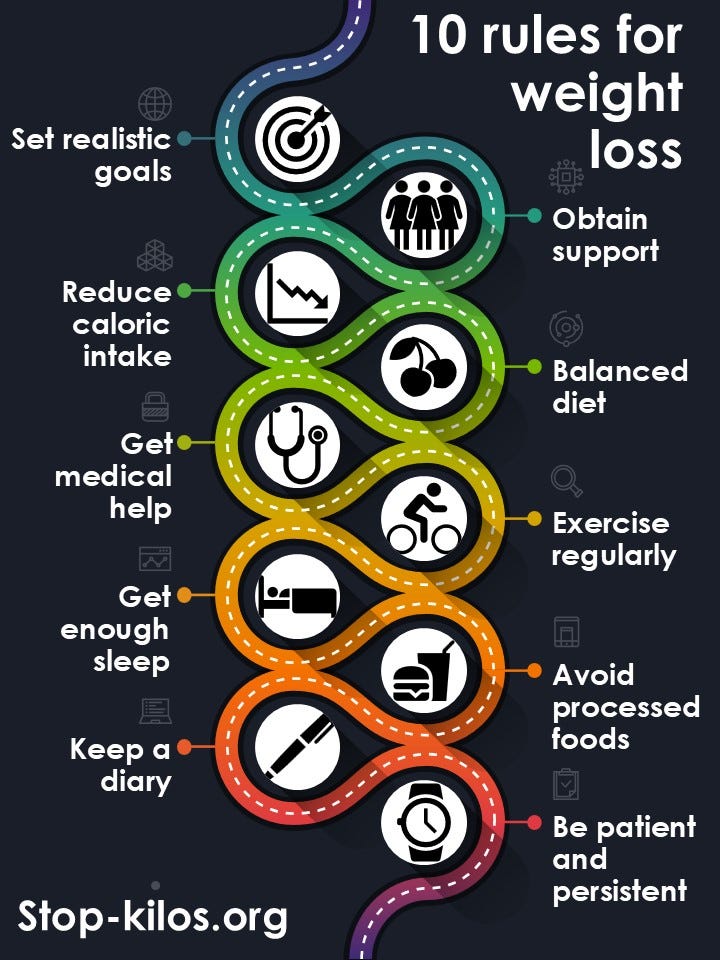If you are obese (BMI>=30), then a medical treatment is required. Weight loss is strongly discouraged if your BMI is below 18.5.
Set yourself realistic and achievable goals: Set goals that are achievable and that you can maintain in the long term. Don't be too ambitious so that you don't set yourself up for failure. Any weight loss, even a small one, is good for your health and should be celebrated as a success. Aim for a weight you can achieve while living a healthy and happy life (e.g. one pound per month).
Seek and find support: Support from friends, family or a support group can make it easier. Consider asking others for help to stay motivated and feel accountable to others: Ask your family and friends for support, call a self-help hotline, join an online discussion forum. As far as possible, avoid people you eat too much with and places where you eat too much and move too little.
Seek medical help: Obesity (BMI>30) is often considered a medical condition that requires medical treatment. Overweight people (BMI>25) also benefit from the care of a team of health professionals. See a doctor who can prescribe an effective treatment or medication: Newer medications (GLP-1 receptor agonists) are particularly effective. Consult a dietitian.
Reduce your calorie intake: To lose weight, you need to create a calorie deficit, i.e. eat fewer calories than your body burns. You can reduce your calorie intake by eating smaller portions, choosing low-calorie foods and avoiding sugary or alcoholic drinks and high-calorie snacks. Eat what you like, but in small quantities. Don't aim for quick weight loss, but aim for regular and stable changes in your habits over the long term. Read in this book the chapters about dieting and fasting. Be aware that the portions served in restaurants are often too big, you don't necessarily have to finish your plate! Avoid eating in the heat of the moment (boredom, frustration) and prepare distraction activities to avoid emotional eating (e.g. brushing your teeth, taking a short walk, washing up or tidying up).
Eat a balanced diet: A balanced diet rich in fruit, vegetables and pulses, wholemeal products, lean proteins and healthy fats is essential for weight loss. These foods provide the nutrients your body needs while keeping you full. Replace sweets and pastries with fruit.
Don't skip meals.
Drink plenty of water: Drinking water will help you feel full and reduce your calorie intake. Replace sugary drinks and alcohol with water. Buy a device that allows you to prepare carbonated water. If you prefer still water, add a slice of lemon or a few mint leaves to the carafe.Avoid processed foods as they're often high in calories, sugar and unhealthy fats. Refined sugar can be addictive, making it difficult to control your calorie intake.
Cook. Cooking is better, healthier, others will thank you and it's more sociable.
Don't eat between meals, sit down to eat, eat with others and not alone, don't eat out of boredom or frustration but find distractions to deal with these triggers.Exercise regularly: Exercise is an essential part of any weight loss program. It burns calories and builds muscle, which boosts your metabolism and helps you burn more calories throughout the day. Get moving on foot, take the stairs. To relax, go for a walk instead of looking at a screen. Talk to a friend about going for a walk or doing sport together - it's more fun together !
Get enough sleep: A lack of sleep can disrupt your hormone balance and metabolism and make losing weight more difficult. Try to get at least 7 to 8 hours of sleep per night. Avoid stress and conflict or try to resolve stressful or conflict-laden situations in other ways.
Keep a diary: keep a record of what you eat and drink and under what circumstances, in what mood and with what feelings you eat and drink. Also keep a record of your weight, your waist circumference, overeating episodes and your expenditure on food and drink. Also write a list of the benefits of losing weight and the disadvantages of being overweight. Such a diary will help you recognize habits and triggers that affect your weight, and it can enable you to change your habits.
Be patient and persistent: Losing weight takes time and effort and it's important that you are patient, committed and stick to your goals. Don't be discouraged by setbacks or slow progress and remember that every small step you take towards a healthier lifestyle is a step in the right direction. Don't strive for weight loss too quickly, be kind to yourself. If you fail, try again and look at your last attempt as an opportunity to learn from it.



